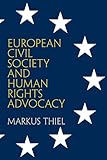European Civil Society and Human Rights Advocacy / Markus Thiel.
Material type: TextSeries: Pennsylvania Studies in Human RightsPublisher: Philadelphia : University of Pennsylvania Press, [2017]Copyright date: ©2017Description: 1 online resource (208 p.) : 13 illusContent type:
TextSeries: Pennsylvania Studies in Human RightsPublisher: Philadelphia : University of Pennsylvania Press, [2017]Copyright date: ©2017Description: 1 online resource (208 p.) : 13 illusContent type: - 9780812294224
- 323.094 23
- JC599.E85
- online - DeGruyter
| Item type | Current library | Call number | URL | Status | Notes | Barcode | |
|---|---|---|---|---|---|---|---|
 eBook
eBook
|
Biblioteca "Angelicum" Pont. Univ. S.Tommaso d'Aquino Nuvola online | online - DeGruyter (Browse shelf(Opens below)) | Online access | Not for loan (Accesso limitato) | Accesso per gli utenti autorizzati / Access for authorized users | (dgr)9780812294224 |
Browsing Biblioteca "Angelicum" Pont. Univ. S.Tommaso d'Aquino shelves, Shelving location: Nuvola online Close shelf browser (Hides shelf browser)

|

|

|

|

|

|

|
||
| online - DeGruyter Marriage Without Borders : Transnational Spouses in Neoliberal Senegal / | online - DeGruyter Women's Human Rights and Migration : Sex-Selective Abortion Laws in the United States and India / | online - DeGruyter Agriculture and the Rural Economy in Pakistan : Issues, Outlooks, and Policy Priorities / | online - DeGruyter European Civil Society and Human Rights Advocacy / | online - DeGruyter Strangers Nowhere in the World : The Rise of Cosmopolitanism in Early Modern Europe / | online - DeGruyter Playwriting Playgoers in Shakespeare's Theater / | online - DeGruyter After Europe / |
Frontmatter -- CONTENTS -- Preface -- Chapter 1. The Genesis and Diffusion of Internal Human Rights Policies in Europe -- Chapter 2. Theorizing Rights Advocacy Through European CSOs -- Chapter 3. The Fundamental Rights Agency and Platform -- Chapter 4. Both Sides of the Story: Probing Legitimacy Through Interview Analysis -- Chapter 5. Validating Findings Through Survey Analysis of Platform CSOs -- Chapter 6. Social Rights and EU Market Liberalization: A Case of Neoliberal Volatility? -- Chapter 7. The Nexus of Internal Rights and Securitized External Border Policies -- Conclusion -- Appendix -- BIBLIOGRAPHY -- INDEX -- ACKNOWLEDGMENTS
restricted access online access with authorization star
http://purl.org/coar/access_right/c_16ec
Adherence to basic human rights norms has become an expected feature of states throughout the world. In Europe, the promotion and protection of human rights through national governments has been enhanced by the diversity of intergovernmental organizations committed to this cause. The latest addition to the continent's rights organizations arrived ten years ago when, based on the EU's Lisbon Treaty, the Fundamental Rights Agency (FRA) was created as a functional institution to highlight and improve human rights within EU member states. In contrast to other regulatory agencies in the EU, the FRA provides a research-based advisory function for EU institutions and legislation and performs a public-diplomacy function in promoting fundamental rights across EU member states.The linking of civil society with internal rights policies has yet produced very little scholarship. Markus Thiel's European Civil Society and Human Rights Advocacy not only fills this vacuum: it also offers a timely analysis in the context of Europe's proliferating human rights challenges, like the current refugee crises and the nationalist responses that geopolitical changes have provoked. European Civil Society and Human Rights Advocacy examines the interaction between the FRA and hundreds of transnational civil society organizations working with and on behalf of vulnerable populations in EU member states and probes the high normative standards of human rights attainment and transnational participatory governance in the EU.Thiel surveys how networking among civil society organizations takes place, to what extent they are able to set the agenda or insert themselves into EU decision-making procedures, and how they are able to exploit the opportunity structure presented by the FRA's institutionalization of a voice for civil society. Thiel draws conclusions for the larger issues of human rights promotion, transnational citizenship, and participatory governance in the region, reflecting broadly and critically on the legitimacy of EU human rights norms through a political sociology perspective.
Mode of access: Internet via World Wide Web.
In English.
Description based on online resource; title from PDF title page (publisher's Web site, viewed 26. Aug 2020)


